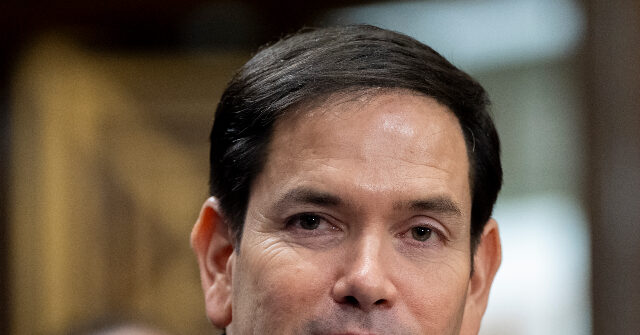


The Chinese government held a meeting with Bolivia’s top diplomat this week as part of a campaign to undo the damage to its reputation and interests in Latin America caused by Secretary of State Marco Rubio making his first international tour in the position to countries there vulnerable to Chinese influence.
Accompanying Wang’s appeals to Bolivia, in which he made barbed references to Latin America not being the “backyard” of the United States, Chinese state propaganda vehicles flooded their pages with attacks on American humanitarian aid efforts and condemned Washington’s concerns that Beijing has undo influence on the Panama Canal.
The Chinese Communist Party made significant strides in its diplomacy with Latin America during the four years that former President Joe Biden was in power, whittling away at support for Taiwan in the region – where Taiwan has traditionally found the most support – and expanding the Belt and Road Initiative (BRI), China’s global debt trap program for impoverished countries. In Panama, President Donald Trump has prioritized removing Chinese influence near the Panama Canal, which the United States built, and sent Rubio to the country as his first international stop as secretary of state.
Trump followed up Rubio’s trip with a visit by United States Southern Command (SOUTHCOM) Commander Adm. Alvin Holsey to Panama this week. The Chinese Foreign Ministry fumed at the increased attention to the country paid by Washington in statements on Wednesday, insisting that it plays no role in the country contrary to evidence Trump claims to have compiled.
“The Chinese side has never participated in the management or operation of the Panama Canal, nor has it intervened in the affairs of the Canal. The alleged argument that ‘China controls the Canal’ is nothing more than a pure lie,” the Chinese embassy in Panama said in a statement on Wednesday. “On the contrary, it has been precisely the U.S. that has threatened time and again to ‘retake’ the Canal, in an attempt to regain control of the Canal.”
“Maneuvers by the U.S. side to sabotage China-Panama relations will find no support and are destined to fail,” the embassy added ominously.
Rubio’s stop in Panama in early February was tremendously fruitful for the United States as Panama agreed to let expire its deal to join the BRI. Panama was the first Latin American country to join the program – allegedly founded to reconstruct the Ancient Silk Road from China to western Europe – and a tremendous loss to China. While conservative Panamanian President José Raúl Mulino was already inclined to limit ties to China, Rubio’s show of support likely boosted his ability to end the BRI with minimal negative political repercussions at home.
At the United Nations headquarters in New York on Tuesday, Chinese Foreign Minister Wang Yi held meetings with top Bolivian diplomats in which he focused on a message directed to all Latin American countries that they can trust the Chinese Communist Party. Bolivia has been governed by radical leftists for over a decade and is currently experiencing significant turmoil as President Luis Arce of the Movement Towards Socialism (MAS) party struggles to maintain control of the nation’s left amid a campaign by former President Evo Morales, who founded the MAS party, to return to power. Morales is currently facing criminal pedophilia charges and barricading himself in his political stronghold, but nonetheless insisting that he will once again become president.
Arce and Morales both enthusiastically support closer economic ties with China. Beijing has taken an interest in Bolivia due to its plentiful reserves of lithium, a mineral key to the development of high-technology, particularly batteries for mobile phones, laptops, and other vehicles. A local newspaper, El Deber, reported this month that the Arce government greatly indebted the country to Chinese and Russian companies by cutting deals to build lithium processing plants; estimates suggest Bolivia must now pay $2 billion plus interest to Chinese and Russian countries. The reports have prompted widespread protests in the country.
Wang did not delve into the lithium issue during his visit this week, instead promising that, contrary to warnings from America, China was a “trustworthy” partner.
“Latin America is the home of the Latin American people, and is not any country’s ‘backyard,'” Wang proclaimed. “China supports Latin American countries in defending their sovereignty, independence and national dignity.”
“China is willing to work with Latin American and Caribbean countries, including Bolivia, to prepare for this year’s meeting and discuss the development plan of China-Latin America cooperation in the next decade,” Wang assured.
The Chinese state media outlet Global Times dedicated much of its coverage this week to attacking the United States for attempting to maintain friendly diplomatic ties with foreign countries.
“The US claims to spread freedom and democracy, but the reality has been very different,” the Global Times warned on Tuesday. “From Latin America to Africa and Asia to the Middle East, the US has long interfered in the name of fighting communism or spreading democracy.”
The Times launched a editorial campaign to disparage the United States Agency for International Development (USAID), an agency that has been in large part dismantled by staunch Chinese government ally Elon Musk. Rather than complain that USAID is too costly for American taxpayers, the Global Times lamented the agency has “used foreign aid for more than half a century to carry out ideological infiltration and so-called ‘democratic reforms.'”
“The USAID is the main foreign aid agency of the US, but, notably, the ‘humanitarian aid’ or ‘development aid’ it claims to provide is mostly accompanied by political preconditions that align with American values,” the state propaganda outlet lamented. “The USAID has publicly formulated a policy in this regard, requiring recipient countries to use aid mainly for the development of private enterprises and not for public investment.”
